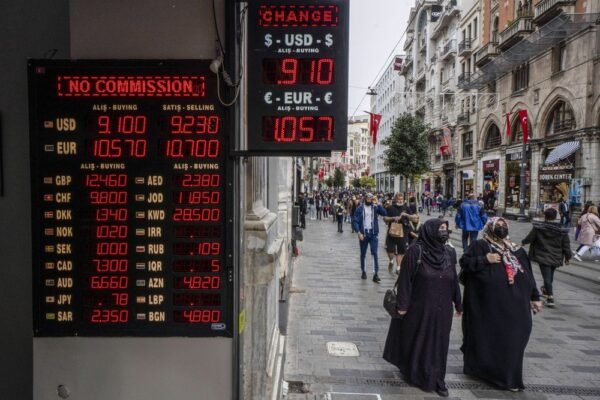The stock market is unraveling as a renewed surge in the Turkish lira frays nerves, forcing investors to hunker down for a new age of high volatility.
The Borsa Istanbul 100 Index and the lira separated this quarter after marching in lockstep for most of the year, with their 30-day correlation becoming negative for the first time in three years. A central bank easing cycle that began in September halved the value of the currency and increased the appeal of equities as a hedge for local investors, while President Recep Tayyip Erdogan’s moves to shore up the lira have dimmed that appeal.
Turkish shares went from a record high to a bear market in less than a week after Erdogan presented his currency rescue plan, highlighting the tremendous volatility afflicting traders. They’re expecting more in the new year, and the lira’s oscillations are expected to be the next major factor.
“Turkish stocks have gone through some serious correction,” said Burak Isyar, head of equity research at ICBC Turkey Investment in Istanbul. “Although volatility is likely to continue for a while more, they still have appeal in the medium-term as long as the lira stabilizes around these levels.”
On Thursday, the Turkish lira rose as high as 15% against the dollar, trading at 10.5345 per dollar at 6:34 a.m. in New York. According to two persons familiar with the situation, the currency’s gain has been aided by foreign-exchange sales by financial institutions, including state banks.
The Borsa Istanbul 100 Index, meanwhile, reversed gains and fell as high as 4.3 percent. On Wednesday, the benchmark had its sharpest five-day fall in more than two decades, closing in a bear market. This week, trading was automatically suspended on many occasions, with heavy margin trading and increased demand for collateral worsening the situation.
On Monday, the total sum of margin calls increased to 1.4 billion liras ($124 million), up from 80 million liras at the start of the month, when the equities benchmark was on its longest winning streak in at least three decades.
“We expect the market to stabilize once the margin call requests are over,” Yunus Kaya, head of research at Istanbul-based brokerage Alnus Yatirim, said by phone on Thursday. “Nevertheless, we see volatility continuing.”
The lira has soared as a result of Erdogan’s actions, which guaranteed investors safety from the currency’s gyrations. This took away one of the main drivers of the Turkish market boom over the last three months.
The steps are meant to reduce ordinary investors’ demand for dollars and put a stop to the country’s currency’s three-month turbulence. However, they are generating concerns about their impact on Turkey’s economic situation, with a gauge of the country’s debt risk nearing record highs since the pandemic began in 2020.
